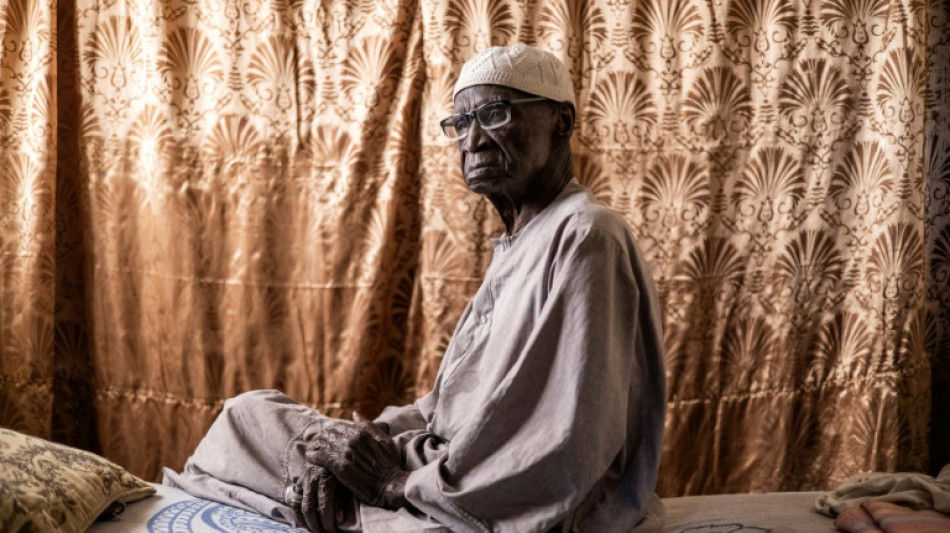
-
 England rugby captain Itoje slams Ratcliffe's 'ridiculous' immigration comments
England rugby captain Itoje slams Ratcliffe's 'ridiculous' immigration comments
-
Europe should speak to Russia with 'one voice', Putin foe says

-
 US Congress impasse over immigration set to trigger partial shutdown
US Congress impasse over immigration set to trigger partial shutdown
-
US to deploy new aircraft carrier to Middle East as Trump warns Iran
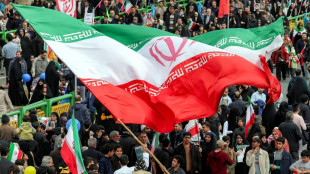
-
 Ubisoft targets new decade of 'Rainbow 6' with China expansion
Ubisoft targets new decade of 'Rainbow 6' with China expansion
-
Stocks trend lower as AI disruption worries move to fore

-
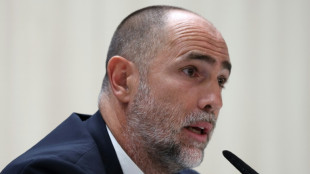 Spurs set to hire Tudor as interim boss until end of season: reports
Spurs set to hire Tudor as interim boss until end of season: reports
-
International crew en route to space station

-
 Man City's Rodri charged over ref rant
Man City's Rodri charged over ref rant
-
Italian biathlete Passler cleared to compete at Olympics despite positive test

-
 Macron slams 'antisemitic hydra' as he honours 2006 Jewish murder victim
Macron slams 'antisemitic hydra' as he honours 2006 Jewish murder victim
-
Tuipulotu warns England to beware 'desperate' Scotland in Six Nations

-
 Cash-starved French hospitals ask public to pitch in
Cash-starved French hospitals ask public to pitch in
-
US consumer inflation eases more than expected to lowest since May

-
 Germany's Merz urges US to repair ties with Europe
Germany's Merz urges US to repair ties with Europe
-
Europe seeks new 'partnership' with US at security gathering

-
 Fresh water leak adds to Louvre museum woes
Fresh water leak adds to Louvre museum woes
-
Floods wreak havoc in Morocco farmlands after severe drought
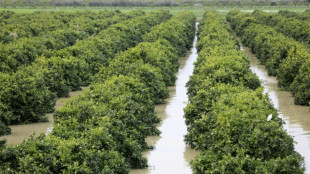
-
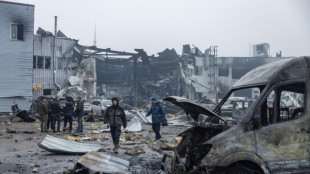 Russia, Ukraine to hold talks in Geneva on February 17-18
Russia, Ukraine to hold talks in Geneva on February 17-18
-
Ukraine's Heraskevych hopes 'truth will prevail' in Olympics appeal

-
 Dumplings and work stress as Chinese rush home for Lunar New Year
Dumplings and work stress as Chinese rush home for Lunar New Year
-
Macron denounces 'antisemitic hydra' as he honours 2006 Jewish murder victim

-
 India-Pakistan: Hottest ticket in cricket sparks T20 World Cup fever
India-Pakistan: Hottest ticket in cricket sparks T20 World Cup fever
-
Cross-country king Klaebo equals Winter Olympics record with eighth gold

-
 Ukraine's Heraskevych appeals to CAS over Olympic ban as Malinin eyes second gold
Ukraine's Heraskevych appeals to CAS over Olympic ban as Malinin eyes second gold
-
Stocks mostly drop after Wall Street slide

-
 Sophie Adenot, the second French woman to fly to space
Sophie Adenot, the second French woman to fly to space
-
Alleged rape victim of Norway princess's son says she took sleeping pills

-
 Activist group Palestine Action wins legal challenge against UK ban
Activist group Palestine Action wins legal challenge against UK ban
-
Driven by Dhoni, Pakistan's X-factor tweaker Tariq targets India

-
 Davidson set to make history as Ireland seek to rebound against Italy
Davidson set to make history as Ireland seek to rebound against Italy
-
Europe defends NATO, US ties at security gathering

-
 China's fireworks heartland faces fizzling Lunar New Year sales
China's fireworks heartland faces fizzling Lunar New Year sales
-
Bangladesh's Yunus 'banker to the poor', pushing democratic reform
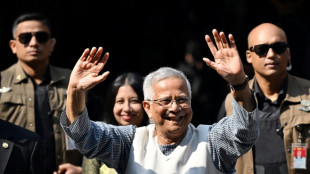
-
 Cracknell given Six Nations debut as Wales make changes for France
Cracknell given Six Nations debut as Wales make changes for France
-
L'Oreal shares sink as sales miss forecasts

-
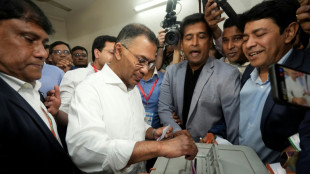 Bangladesh nationalists celebrate landslide win, Islamists cry foul
Bangladesh nationalists celebrate landslide win, Islamists cry foul
-
Thai PM agrees coalition with Thaksin-backed party

-
 Zimbabwe pull off shock win over Australia at T20 World Cup
Zimbabwe pull off shock win over Australia at T20 World Cup
-
Merz, Macron to address first day of Munich security meet

-
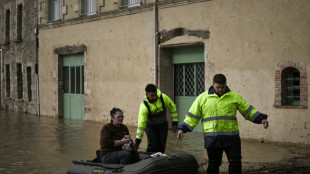 Three dead, many without power after storm lashes France and Spain
Three dead, many without power after storm lashes France and Spain
-
Bennett half-century as Zimbabwe make 169-2 against Australia

-
 Asian stocks track Wall St down as traders rethink tech bets
Asian stocks track Wall St down as traders rethink tech bets
-
'Weak by design' African Union gathers for summit
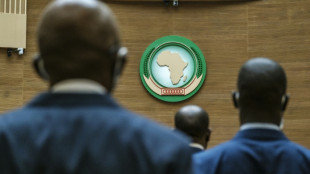
-
 Nigerian conservative city turns to online matchmaking for love
Nigerian conservative city turns to online matchmaking for love
-
Serb-zero: the 'iceman' seeking solace in extreme cold

-
 LeBron James nabs another NBA milestone with triple-double in Lakers win
LeBron James nabs another NBA milestone with triple-double in Lakers win
-
Hundreds of thousands without power after storm lashes France
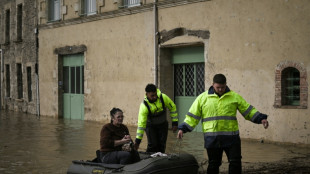
-
 US Congress impasse over migrant crackdown set to trigger partial shutdown
US Congress impasse over migrant crackdown set to trigger partial shutdown
-
AI's bitter rivalry heads to Washington


New movie turns spotlight on France's forgotten colonial troops
"They made us join up to wage war," said Ndiogou Dieye, 103, casting his memory back more than eight decades to when he and other young Senegalese donned uniforms to fight for distant France.
"We didn't know where we were going."
The wizened old soldier is one of the last survivors of France's colonial-era African infantry -- a force that fought in two world wars and colonial conflicts in North Africa and Indo-China.
After years of neglect, the troops are the subject of a blockbuster movie, "Tirailleurs," opening in France and Senegal this week, that stars Omar Sy -– best known internationally for the Netflix crime series "Lupin".
Sy plays a Senegalese father who voluntarily enlists in the French army in World War I to keep an eye on his son, who has been forced into uniform. Both are pitched into the horrors of the Western Front.
The "tirailleurs" -- loosely translatable as "skirmishers" -– were born in Senegal in 1857, to forge a corps of lightly armed, mobile troops who would harass the enemy ahead of an advancing main force.
After World War I broke out, France recruited across its West African colonies to transform the tirailleurs into a force designed to hammer the Germans on the Western Front.
They took part in several key battles, notably holding the line at a crucial moment in Verdun in 1916, arguably the most important battle in the four-year-long conflict.
- Toll -
Some 30,000 of the 134,000 tirailleurs who fought in WWI were killed, according to the specialist French magazine Historia.
Survivors were often crippled or scarred by trauma, yet their tale was often relegated to footnotes, and their names never featured on local war memorials in France -- the daily reminder to French people of the cost of the conflict.
High-sounding plans to provide hospitals and pensions were downgraded or sapped by bureaucracy, and tirailleurs sometimes suffered second-class treatment compared with their French counterparts.
In World War II, tens of thousands of tirailleurs fought in sub-Saharan and North Africa and took part in the 1944 landings in southern France.
Dieye said he was recruited in May 1940 in his home town of Thies, about 70 kilometres (45 miles) from Dakar, and joined the Seventh Regiment of tirailleurs.
After basic training near Dakar, his unit was shipped out to Madagascar but had to turn around because of a submarine threat.
It then headed to the French Congo and then to Gabon, where it liberated the capital Libreville from the collaborationist Vichy government "after a few shots," he said.
The regiment was sent to the Middle East to prepare for operations in Europe, but by then, Berlin had fallen.
Dieye returned to Senegal in 1945 as a sergeant, and in the post-colonial period joined the police, retiring in 1972 at the age of 52.
Today, he lives in a house in Thies surrounded by photos and memorabilia from his years of service.
- Anger -
Slow-moving but sharp-eyed, he is bitter towards France, accusing it of "dishonesty".
In December 1944, French troops at a barracks near Dakar opened fire on mutinous tirailleurs demanding back pay for years spent in prisoner-of-war camps.
The official toll of 35 dead is disputed, and the common grave where the soldiers were buried has never been found. The episode remains murky and bitterly remembered in Senegal despite an attempt by former French president Francois Hollande to shed light for reconciliation.
"You send someone to war, he claims his money and you punish him" by killing him, said Dieye, a tone of disgust in his voice.
He reserves his greatest anger for France's failure to pay his military pension, equivalent to 750 euros (dollars) annually, for the past two years.
"France hasn't kept its promise," he said. "I depend on the Good Lord and my children to survive. I get nothing as a former tirailleur. Zilch from France."
A source at the Veterans' Affairs Office at Senegal's armed forces ministry said that after military pensioners reach the age of 100, France usually requires documented proof that they are still alive.
Historian Mamadou Kone said he believed only 10 or so tirailleurs from World War II were still alive in Senegal. The last tirailleur from World War I, Abdoulaye Ndiaye, died in 1998 at the age of 104.
At home, tirailleurs were long "ostracized, considered armed enforcers of French imperialism. Their image was stained," said Kone.
Things changed in 2004, when then president Aboulaye Wade named December 1 as an annual day to commemorate the tirailleurs, enshrining their achievements "in two world wars which freed the world from Nazism and fascism," he said.
U.AlSharif--SF-PST


